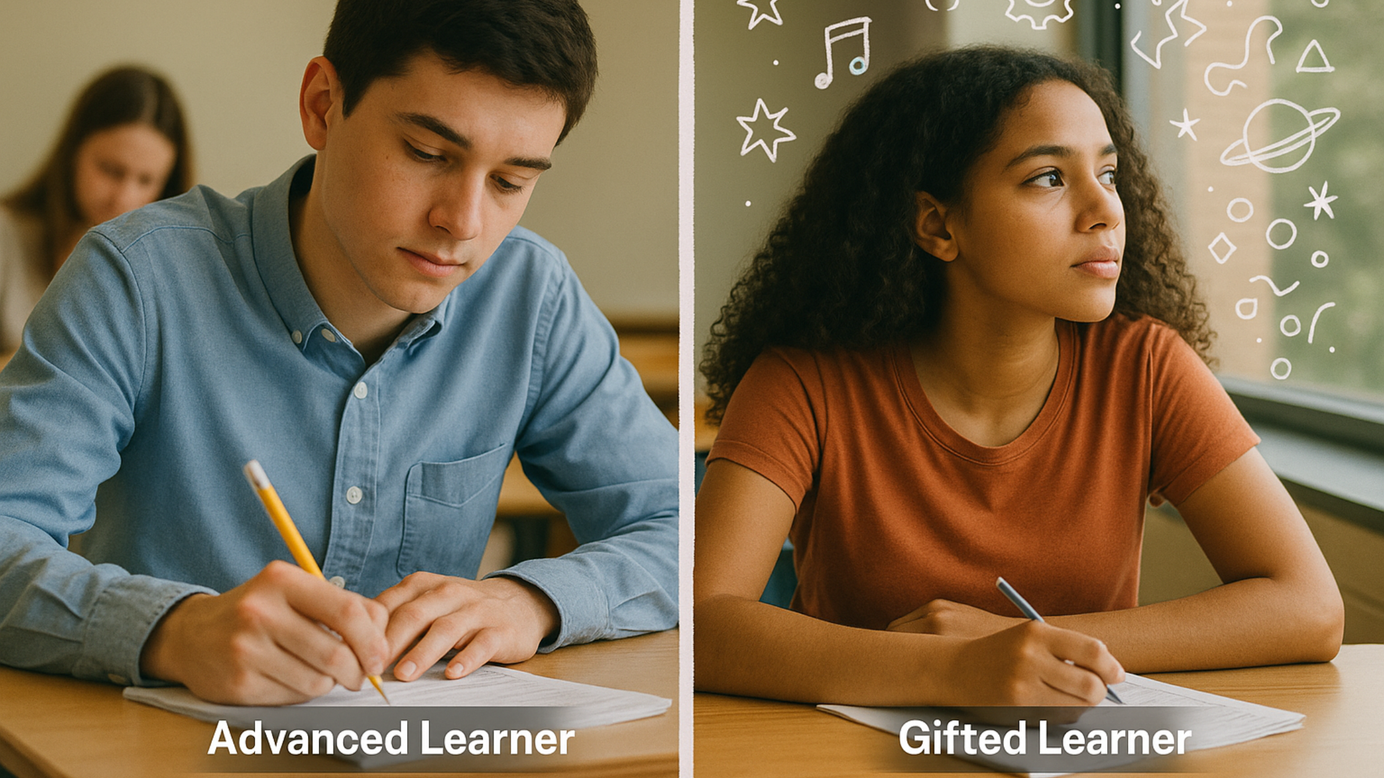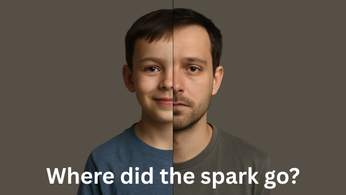
What's the Difference Between Advanced and Gifted Learners
Not all high achievers are gifted. Here’s how to tell the difference, and how to support both.
[All Ages 🌟] • [Intelligence 🧠] • [Discover 🔍] • [Insights 📊]
Introduction
Parents, teachers, and even school administrators often use the terms "advanced" and "gifted" interchangeably. Although the confusion is common, the distinction is critical, especially when it comes to how we educate and support children. Not understanding the difference can lead to misdiagnosis, misplaced expectations, and missed opportunities to support a child in the way they truly need.
This article unpacks the key differences between advanced and gifted learners, why definitions matter, and how to better support both.
Definitions Matter
What Is an Advanced Learner?
An advanced learner is a student who performs above grade level in one or more academic subjects. Think advanced English, AP US History, and honors-level math.
These students excel in the standard classroom setting, often requiring more challenging material or a faster pace to stay engaged. They typically:
- Do well on standardized tests
- Receive high grades
- Thrive in honors or accelerated courses
- Respond positively to structured challenge
What Is a Gifted Learner?
Gifted learners are not simply students who are doing well in school.
Giftedness refers to a student's potential rather than just their current performance. These students often demonstrate exceptional intellectual, creative, artistic, or leadership abilities that go far beyond what is typical for their age. They may:
- Learn complex material quickly and independently
- Think abstractly and make unusual connections
- Exhibit emotional intensity and sensitivity
- Show asynchronous development (e.g., advanced intellectually but average socially)
Giftedness isn't confined to academics. A student might be gifted in music, visual arts, problem-solving, empathy, or intercultural competence—areas that aren't easily measured or supported in traditional classroom settings.
Performance vs. Potential
One of the most important distinctions between advanced and gifted students lies in performance versus potential.
- Advanced students are currently ahead of their peers in academic performance. They do well in school, often because they work hard, are motivated, and are responsive to traditional instruction.
- Gifted students have natural potential that may or may not be realized in academic performance. They may be underachieving, misunderstood, or even misdiagnosed as defiant or disinterested.
A student can be advanced in math without being gifted in math. And a gifted student in math may find even advanced math classes boring or shallow because they seek deeper, more conceptual challenges.
Cognitive, Social, and Emotional Differences
| Trait | Advanced Learner | Gifted Learner |
|---|---|---|
| Cognition | Fast, accurate learner | Deep, abstract thinker |
| Motivation | Task-oriented, competitive | Curiosity-driven, meaning-seeking |
| Creativity | Works well within frameworks | Breaks or reimagines frameworks |
| Social | Age-typical peer relationships | May prefer adults or feel out of sync with peers |
| Emotional | Age-aligned | Emotionally intense, sensitive, asynchronous |
| Academic Fit | Thrives in rigorous classrooms | May feel disconnected or bored |
The Misdiagnosis Problem
When giftedness is misunderstood, students may be misidentified as lazy, inattentive, or even oppositional. Their resistance isn't about capability—it's about fit. A gifted student might not see the value in rote tasks or repetitive instruction, leading to disengagement.
On the other hand, advanced students are sometimes labeled as gifted simply because they are high achievers. While they may perform exceptionally well, their needs are different from those of a gifted learner.
Getting this wrong means gifted students may never get the deep, open-ended learning they need, while advanced students may be pushed into programs that don't match their learning style.
Identification Methods
How Advanced Learners Are Identified:
- High grades
- Standardized test scores
- Teacher recommendations
- Observable classroom performance
How Gifted Learners Are Identified:
- Cognitive assessments
- Behavioral observations
- Portfolios (for creative/artistic giftedness)
- Interviews and open-ended problem-solving activities
Educational Needs and Strategies
Advanced Learners Benefit From:
- Accelerated curriculum
- Competitive academic environments
- Structured enrichment opportunities
- High expectations and goal-setting
Gifted Learners Need:
- Differentiated instruction tailored to their pace and interests
- Opportunities for independent study or project-based learning
- Emotional and social support for their sensitivities
- Flexible curriculum that allows for depth, complexity, and creativity
The Bigger Picture—From Gift to Talent
Giftedness is only the beginning. It is raw potential. Without the right support, environment, and encouragement, giftedness may remain dormant. On the other hand, when nurtured intentionally, that potential can be developed into a talent—a strength that becomes valuable and impactful in the real world.
A gift is something you're born with. A talent is something you grow.
That journey from gift to talent is what matters most. And it’s where the real opportunity—and responsibility—lies.
Conclusion
Not every advanced learner is gifted, and not every gifted learner is thriving. Understanding the difference isn’t about labeling—it’s about unlocking the right kind of support.
At GiftedTalented.com, we help parents discover which path their child is on, and how to support them through personalized resources, insights, and learning opportunities.
Giftedness isn’t just about doing more. It’s about being different.
And when you know the difference, you can make all the difference.
🧭 Quick Summary for Parents
- Advanced learners are students who perform well in school. They’re ahead of their peers academically and thrive in structured, challenging classrooms.
- Gifted learners have natural potential that often goes beyond what school measures—intellectually, creatively, emotionally, or socially. They may or may not perform well in a traditional academic setting.
- A child can be advanced but not gifted, or gifted but not thriving.
- Giftedness isn’t better—it’s different. It requires a different kind of support, including emotional understanding, intellectual depth, and flexible learning opportunities.
- At GiftedTalented.com, we help you figure out which path your child is on—and how to nurture their full potential.
David Yi is one of the world’s leading voices in gifted education. As co-founder of GiftedTalented.com and former head of Asia for ACT.org and K12.com, he has spent 20+ years building breakthrough programs for high-potential students across Asia and the US.
GiftedTalented.com
The world's fastest growing gifted & talented community








